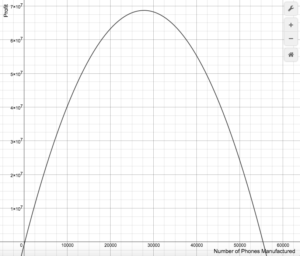We began this module by considering how polynomials can be used by computers to create digital images (remember the dolphin?). Let us close with a different example of polynomials in real life, the profits of a cell phone company. In the following polynomial function, the variable [latex]x[/latex] represents the number of phones manufactured.
[latex]P(x)=-0.09x^2+5000x-750,000[/latex]
Using an online graphing calculator, we generated the graph of the profit equation as seen below.

The x-axis represents the number of phones manufactured, and the y-axis represents the profit earned by the company. Because the company must invest money into machinery and workforce to manufacture phones, when no phones have been made, the profit for the company is negative. In other words, the point [latex](0,-750,000)[/latex] represents no phones made and [latex]$750,000[/latex] invested.
The top of the curve represents the “sweet spot” that many business would like to achieve between making and spending money. Using some tools from later math classes, we can find that the maximum amount of profit that can be gained from producing [latex]27,777[/latex] phones.
Polynomials have many practical uses and have been studied widely by mathematicians for many years. Our vast knowledge of how they behave mixed with high speed computing allows us to continue to find even more uses for them.
